By Marvin Marroquin • Updated: 01/30/2023 • 12 min read
So you bought your first gun and now you’re ready to take on any threat that comes your way, right? Slow down skippy.
Owning a gun is more than just the gun itself. It’s also about safety, training, preparedness, and good old fashioned fun and community! Here’s a list of things that will make your gun owning experience fun and safe.
Range Bag
As a gun owner, you’ll need a way to organize and transport your gun and gear to the gun range. There’s a plethora of options that will meet all kinds of needs. They come in all sorts of colors, sizes, materials, functionality, etc. One important thing you’ll want to look for is quality construction. You’ll be storing a lot of equipment in there and the weight will add up quickly. You don’t want to go cheap only to have it tear up after a few uses.
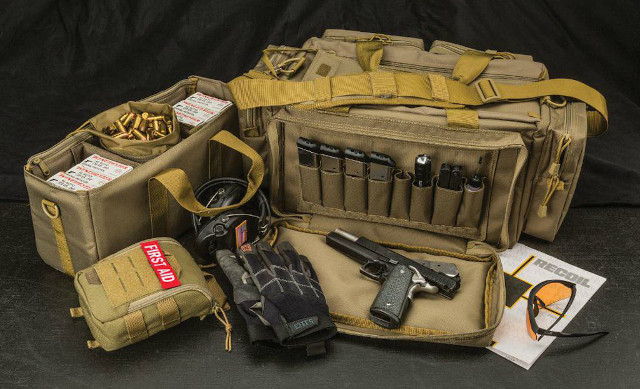
A great quality range bag will start around $50 from a reputable brand. Some examples of great brands to check out are 5.11 Tactical, Blackhawk, and Maxpedition. Consider how you’ll be using the bag first before committing to one. Will you need multiple guns? Are you going to stuff all your equipment in one bag or do you have a separate storage for your gun?
Another thing to look for is padding on the bottom so it doesn’t buckle when carrying it and damage your equipment when you lay it down. You may have sensitive and expensive gear such as optics that can easily be damaged. Make sure there are also compartments to easily organize everything.
Weatherproofing, or at least waterproofing, materials may also be something to consider depending on the environment you’ll be training in. Molle webbing on the exterior is great for expanding the bag with other storage compartments. Adjustable and durable straps are also great to handle the weight. Finally, a solid YKK zipper ensures you can close your bag when it’s stuffed with all your heavy goodies.
Safety Gear
Shooting guns is fun but we also want to safe. Most gun ranges require eyes and ear protection at minimum. Many of them can provide these for a small rental fee. I don’t know about you, but I’d rather have my own gear. Again, there are way too many options available here but thankfully only a few things to consider.
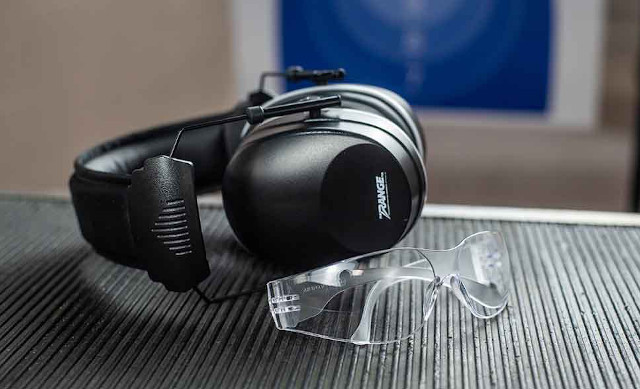
For eye protection, you want a pair of dedicated glasses for the range so don’t wear your personal everyday glasses out there. They can easily get scratched. If needed, they do make prescription eye protection, or if you’re able to wear contacts that’s another option.
Make sure they’re a solid construction, this goes without question. You don’t want them to crack when bullet casings are flying around. They’re also available with some type of tint or sun protection, which is great for outdoor ranges.
For ear protection, they generally come in 3 types: ear plugs, ear muffs, and electronic headsets. Ear plugs are made of moldable materials that can easily fit in your ear canal and expand to create a tight seal. Ear muffs fit just like stereo headphones over the head and cover the entire ear. Electronic headsets are ear muffs with technological features built in to further reduce loud noise levels while allowing you to still hear low noises, such as voices when talking.
It’s important to check for the NRR (Noise Reduction Rating) and choose one that fits your needs. When shooting pistols, you’ll be firing with your arms extended and away from your ears. When shooting a rifle, you’ll be shooting off your shoulder and closer to your ear. An average NRR range for shooting is about 28 – 31 NRR. It’s common for rifle shooters to combine ear plugs with ear muffs.
Some shooters will also bring gloves to the range, this is completely optional. The reason some use gloves is to protect the hands from soreness, and even blisters, from extended shooting. Some people spend the entire weekend, which can be 10-25 hours, training and going over drills. That amount of time will take a toll on yours hands. If you’re a casual shooter spending a couple hours at the range, you’ll be fine without them.
Cleaning Kit
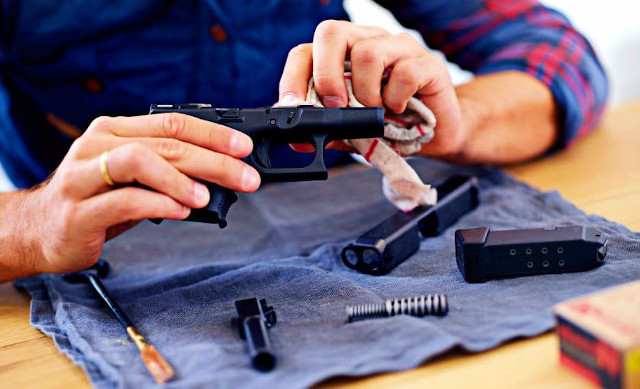
Cleaning is important to ensure your firearm remains in the best long lasting and functioning condition at all times. These range from minimal field kits to an extensive deep cleaning kit. At minimum, you want to put together a quick field cleaning kit. This will allow you to do the most basic necessary cleaning in the field without having to take apart every component of your pistol.
A field cleaning is simply removing dirt/debris and lubricating components from the bore and slide area. You’ll probably do this if you start experiencing a malfunction due to environmental conditions or lubrication wearing off. Deep cleaning intervals are really a personal preference. I like deep cleaning every 1,000 rounds or 6 months, whichever comes first.
Holster
There are so many things to discuss about holsters that it truly needs a dedicated article. Things to consider are construction, safety features, comfort, mounting type, angle of draw, retention, and the list goes on. Again, many factors are personal preference and you’ll need to consider how you’re using it.
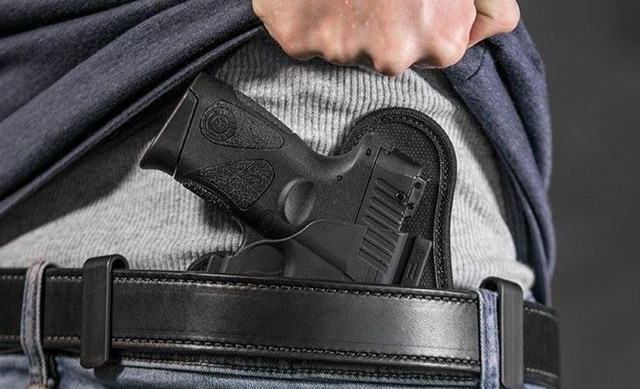
Most concealed carriers prefer an IWB (Inside Waistband) holster. This holster mounts between your pants and your body and allows the gun to sit closer to your side for better concealment. Just make sure you’re using one with great retention. You want one that ensures your gun is secured in the holster to avoid accidents.
Many carriers find themselves going through several holsters before finding the best one for their needs. There are way too many options to discuss here, but the journey to finding the one is fun.
Ammunition
Obviously, you’re going to need ammunition for your gun. Check your local gun laws to see which are permissible to carry. FMJ (Full Metal Jacket) loads are common to practice with at the gun range. JHP, or simply HP, (Jacketed Hollow Point) loads are commonly used for self defense.
FMJ loads are constructed in a way that causes it to penetrate much farther than self defense ammo. Because of it’s cheaper price, novice shooters may be tempted to use it all the time. In a self defense scenario, you don’t want rounds that over-penetrate and could potentially hit another person behind your target.
JHP loads are best for self defense because their construction is designed to cause damage to the target only. This is because it will expand and slow down once a target is hit. Although they’re very popular for self defense, there are a couple of states where JHP loads are illegal (thanks New Jersey).
Extra Magazines
You can never have enough magazines, tell your bank account to stop whining. But seriously, extra magazines are great because you can have some for dedicated range use and dedicated carry use. It also reduces the amount of time you spend loading at the range. Just make sure they are great quality from reputable brands. A crappy cheap magazine can cause malfunctions when firing.
Extra Batteries
This only applies if you have accessories that require batteries such as flashlights, shot timers, etc. You want to keep everything functioning properly when carrying or training.
Medical Kit

Depending on the type of training you’re into, a small basic medical kit will come in handy for cuts, scrapes, and burns. Bleeding on your gear sucks. Don’t assume the range will have a kit available. If the injury is serious enough, you’ll be asked to leave. It’s also beneficial to learn how to use a tourniquet if needed during a self defense scenario or crisis.
Speed Loader
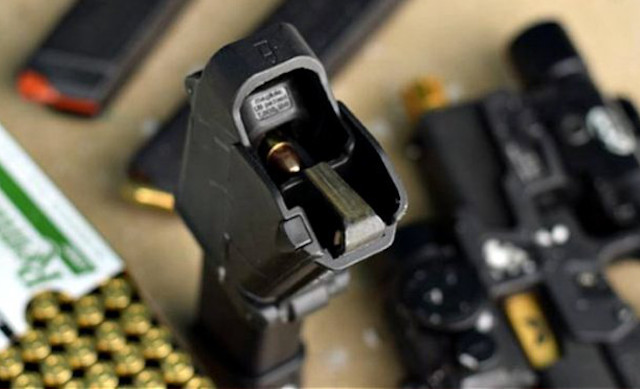
Whoever designed this accessory is the man (or woman)! This makes loading magazines so much easier than manual loading. If you’ve spent time loading several magazines at a time at the range, you feel the pain in your fingers right now. Speed loaders are a God send, truly. Get it if you don’t have one already. They’re available for pistols and rifles.
Training
I cannot stress enough the importance of getting the proper training. Buying a gun doesn’t automatically make you Jason Bourne. You need to train with it to build muscle memory and be proficient at using it when the time comes. Don’t be afraid to be the only “noob” at the gun course. We’ve all started somewhere and the gun community is friendly and wants you to be properly trained.
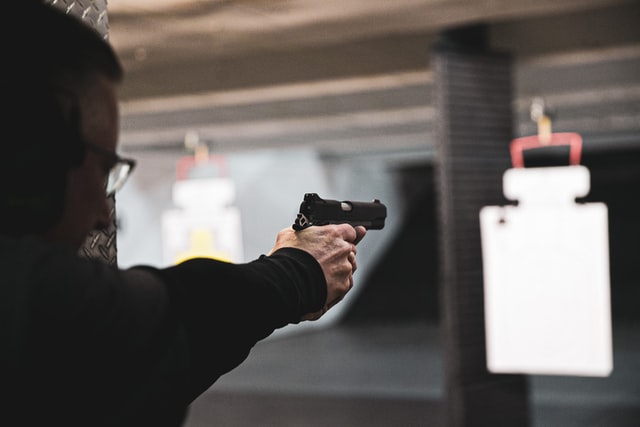
Also, don’t just go to the gun range to shoot at paper targets. You’re going to need to evaluate your lifestyle and train for that. For example, do you spend a lot of time driving in your daily life? You’re going to want to train how to draw your pistol from a seated position with a seatbelt on. You don’t want to figure out how to defend yourself in the heat of the moment. Being prepared and practicing the right tactics for your lifestyle will save your life.
Targets
Most gun ranges will provide targets for a small fee. Some outdoor gun ranges won’t though. You’ll want to have some on hand in case your local range doesn’t. You may also need a stapler to mount your target to the wooden or cardboard posts.
Safe Storage
Aside from a range bag for safe storage and transporting your gun, it’s a good idea to have a safe or secure storage compartment for it at home. This is especially important if you have kids at home. Even if you’re single and live alone, it’s probably still a good idea to prevent theft.
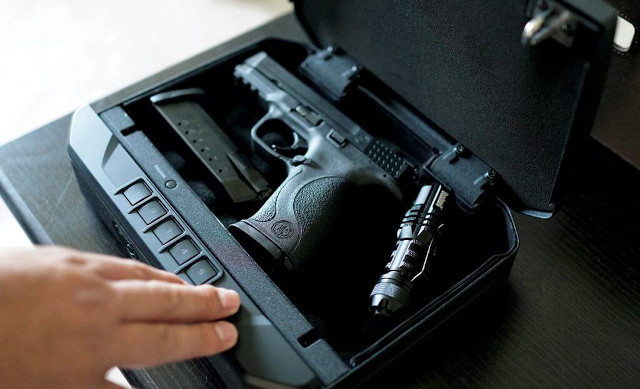
There are a few schools of thought concerning safes. Some would argue that in a self-defense situation, it may be difficult to get to your firearm when you need it. A safe adds another step that can cost you precious time.
My philosophy is that it’s always a good idea to have a safe if for no other reason than to prevent theft. If you believe your life is truly in danger and it’s very likely you’ll need it for self-defense (this is very common for women who are threatened by an ex-partner), then I suggest carrying inside your home at all times. The main idea here is that you want to know your gun is safe at all times, either in storage or on you.
Multitool
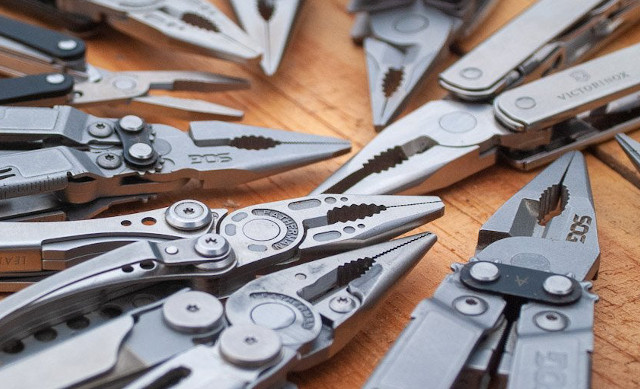
A good quality multitool is great for field stripping your weapon, replacing parts, adjusting or repairing accessories, etc. There are so many uses and you’ll never know when you might need one. You’ll want to avoid finding out the hard way. Some great brands to check out are Gerber, Leatherman, Victorinox, and SOG.
Flashlight
Flashlights are great to have especially in a home defense situation. If someone kicks down your door at 3am, you don’t want to just rush towards the noise and start shooting. A flashlight will help you identify the target. It’s also useful if you’re going to train at night. There are many weapon mounted flashlight systems available for pistols, rifles, and shotguns. As with anything, make sure you get one that is good quality and from reputable brand, such as Streamlight, Surefire, Inforce, and Olight.
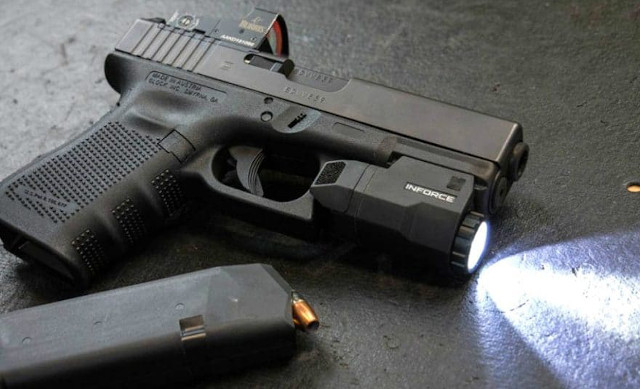
When looking for a flashlight, pay attention to the lumens rating (how bright a light is). The average lumens is anywhere from 200-500 on a decent flashlight. It’s especially great for indoors if you have light colored walls. A higher lumens flashlight can also potentially blind you by the light reflected from a light colored wall and/or mirrors. Some professionals in the training industry advocate for a rating as high as 850 lumens. A rating that high is especially great for outdoor use.
Concealed Carry Insurance
Self defense doesn’t stop after firing your gun. Carry insurance is probably the least talked about “must haves” for gun owners. We often don’t talk about the ramifications of defending yourself, especially with deadly force. It’s not fun. It’s not sexy. It’s quite possible you could end up in jail for using deadly force.
The cost to defend yourself in court is insane. Seriously, you can easily rack up a $100,000-$250,000 bill in court and lawyer fees. These days, the media will drag your name through the mud and you may even lose your job. On top of all this, think of the added stress you and your family will take on for months, and realistically even years.
The benefits of carry insurance far outweigh the cost of not having one. You do not want to wait until it’s too late and you’re sitting in jail for months awaiting trial. There are very great and reputable programs out there, and they only cost a few hundred dollars per year. A very small price to pay for your freedom and a great defense team.
Some great reputable programs are offered by the USCCA, CCW Safe, and US Law Shield. As always, do your research and pick the best plan for you and your family.
